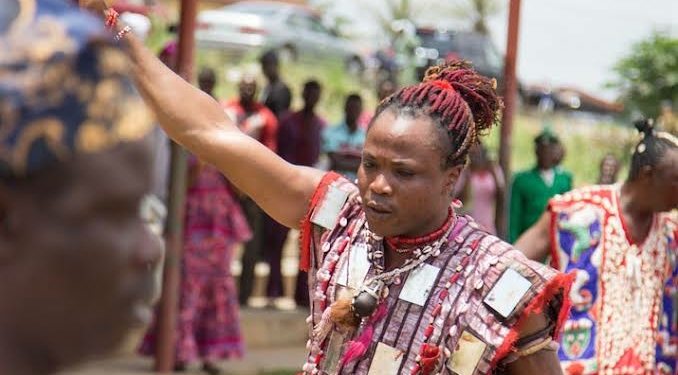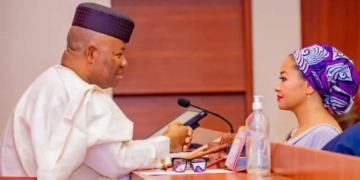For “lovers of traditions” and followers of African religion to commemorate “sèse Day,” four southwest states—Ogun, Oyo, Osun, and Lagos—proclaimed Monday, August 21, as a public holiday on Saturday. When two states—Ekiti and Ondo—decided not to follow suit, the proclamation sparked some debate.
While some adherents voiced worry over the fact that these two governments did not declare Monday as “sèse Day,” some Muslims and Christians who have at least three days to celebrate their respective holidays are equally vocal about their displeasure with the decision by four states.
Only four states—out of a total of 36—have designated Monday a public holiday in honor of the Sese Festival, but some Christians and Muslims are not thrilled about this development.
I found it fascinating that some Christians and Muslims joined forces to combat followers of African traditional religion in the debate that followed the statement. When you ask them what benefits they would derive by denying traditionalists the right to celebrate their festival, they respond that the declaration signals the revival, weight growth, and momentum of a ritualistic religion.
I had the honor of speaking with some Christians and Muslims who disagreed with the announcement. I noticed that the proclamation was not only the problem, but also the alleged acceleration of African religion, as they laid forth their complaints. While I was online browsing, a fairly irate Muslim commented on a Facebook post, saying, “We can’t be working to ensure the death of idolatry while some governors would continue issuing directives that would strengthen them.”
To be quite honest, after reading the message, I felt terrible for the lack of respect for religion that has continued to cause significant difference among our people. Even though some people practice idolatry, it is not a sin that one should find repugnant. I reasoned that I probably do not understand the fundamental definition of idolatry. I focused on my dictionary and looked up “idolatry” there. The Oxford Dictionary defines idolatry as having a great deal of respect for something or someone. Why is it upsetting when someone else has a deep love, adoration, or reverence for something or someone?
Christians have a great deal of admiration for Mary’s son, Jesus. Muslims don’t make jokes about Muhammad, who is also Aminat’s son. Traditionalists believe that gods like Ogun, Sango, Osun, and Obatala, among others, are deserving of respect and adoration. Why should the Abrahamic religions not feel the same way about the deities who are regarded as Olodumare’s messengers if traditionalists do not find it repulsive when Christians and Muslims revere Jesus and Muhammad? Everyone who practices religion engages in idolatry. It just had different features.
Religion is not exclusively spirituality since religion involves an organized entity with rituals and practices centered on a higher force or God, whereas spirituality involves a personal search for life’s purpose. However, you cannot practice any religion if you are not spiritual. Religion does in fact promote spiritualism that is limited. You will be constrained within the spiritual boundaries of the faith to which you belong. In every faith, spirituality is the first step toward divinity. Any religion that does not have spiritual motivations need to be disregarded.
There are three main categories of spirituality to consider while discussing it: spiritual individualism, spiritual collectivism, and spiritual conversation. Without these three, any religion is a sham. These are among the numerous components of traditional African religion, but some continue to query whether the religion is particularly spiritual or not. I can assure anyone who is concerned that traditional African religion is quite spiritual.
Permit me to cite a case study. I once enquired about the spirituality test of African traditional religion from two senior coworkers who are ardent adherents of Abrahamic religions. Both used the Osun Osogbo celebration as an example of how spirituality may be found in traditional African religion. He described how two Christians who had accompanied him to the festival in the past for just sightseeing fell into a trance when they heard the music. He also said that before things stabilized, Osun priestesses at the groove had to intervene.
Another buddy described how he noticed an odd rise in the Osun River’s waves whenever priestesses sung spiritual praises in the water. He also discussed the throwing of kolanuts to take destiny’s place and the similarities between the images he had of his buddies. These two coworkers, who prefer to identify as Christians and Muslims respectively, acknowledge the spirituality present in traditional African religion.
Evangelism exists in Christianity. Jihad is an Islamic concept. There is no such thing as an African traditional religion, yet it has endured years of assaults, misunderstandings, misrepresentations, and blackmail from representatives of Abrahamic religions and is still surviving. Luckily for these people, the proponents of African traditional religion are either not creative or have no ideas at all for how to expand their religion like others.
Nigeria is a secular nation. Even though Yeye Ajisekemi’s and other people’s rights were violated by some fanatics and the law and its enforcers remained silent, it permits participation in any religion a citizen chooses and asserts that it is protecting their freedom to conscience, thought, and religion. The leaders of Nigeria must take care to ensure that the protection of religious freedom extends beyond the pages of the constitution. It must be made very clear that everyone is free to believe and practice their religion in both public and private without fear in this nation.
I was confused when the Yeye Ajisekemi problem arose because I had assumed that traditionalists would exploit the circumstance to make demands of the government. There has never been a better opportunity for followers of traditional African religion to make their case and increase their chances than right now. It must not be in vain that Tani Olohun, a campaigner for the liberation of African traditional religion, was arrested. It needs to be met with demands like the establishment of boards and institutions like Muslim and missionary schools.
There are Muslim and Christian welfare boards in Nigeria that have been set up for pilgrimages and other religious commitments, and they are in charge of overseeing the departure of billions from our faltering economy to strengthen host nations’ economies. Let there be forums for traditional African religion as well. While other welfare boards make Nigerians poorer and the economy more difficult, these boards would ensure that our cultural and traditional places are strengthened, made appealing, and able to house millions of international visitors, which would help our struggling economy and increase revenue. We owe the church, but those who are making millions can teach us how to do business.
Traditionalists should also push for the establishment of or allocation of schools like missionary and Muslim schools, which would be under government control but allow students to learn through the lens of our culture and traditional beliefs. This is in addition to calling for boards to strengthen cultural and traditional sites. This would provide kids the opportunity to learn about authentic cultural and traditional beliefs as early as elementary school, spreading African traditional religion from the ground up and preparing it to compete when technology is predicted to take over the world.
A balance would be created for African traditional religion when boards and schools are brought into our system, among other things. I also feel that our curriculum has to be changed. In addition to Yoruba, there ought to be another subject that will introduce them to the real religious doctrine and practice of their ancestors rather than what they see on screen or read in books.
I’ve watched a few videos by certain traditionalists ranting about the activist’s detention and alleged conspiracy since the Yeye Ajisekemi and Tani Olohun controversy began. They entirely predicated their demand on Tani Olohun’s release, a proponent of the liberation of African traditional religion. They have forgotten that Tani Olohun would eventually be freed, but they are still in need of solidifying their institutions and forming strong organizations like MURIC and CAN, among others, that would be ready to pounce at the first sign of trouble.
Traditionalists have a reputation for being bad and should be avoided, according to a number of Alfas and Pastors over the years. Even if the bulk of these followers of Abrahamic religions practice African religion, Muslims and Christians who are born into them are in the majority. One is forced to question why Christians and Muslims feel frightened by traditionalists’ actions when they assert to have committed followers and potent mystics who can settle this issue quietly. Why are the majority of people who identify as followers of authentic religions of God, as well as those who profess to do so, furious at attempts by followers of the Ìsèse movement to honor their gods?
I believe that rather than working endlessly to ensure that it does not happen, devoted practitioners should be able to summon fire from above to consume the traditionalists during their festival. Today, as we celebrate the Sese Festival, I believe that traditionalists should gather and make plans to strengthen their institutions and build artificial support systems to supplement the natural support systems already in place rather than just eating and celebrating alone. Schools and boards are also due to them.




Discussion about this post